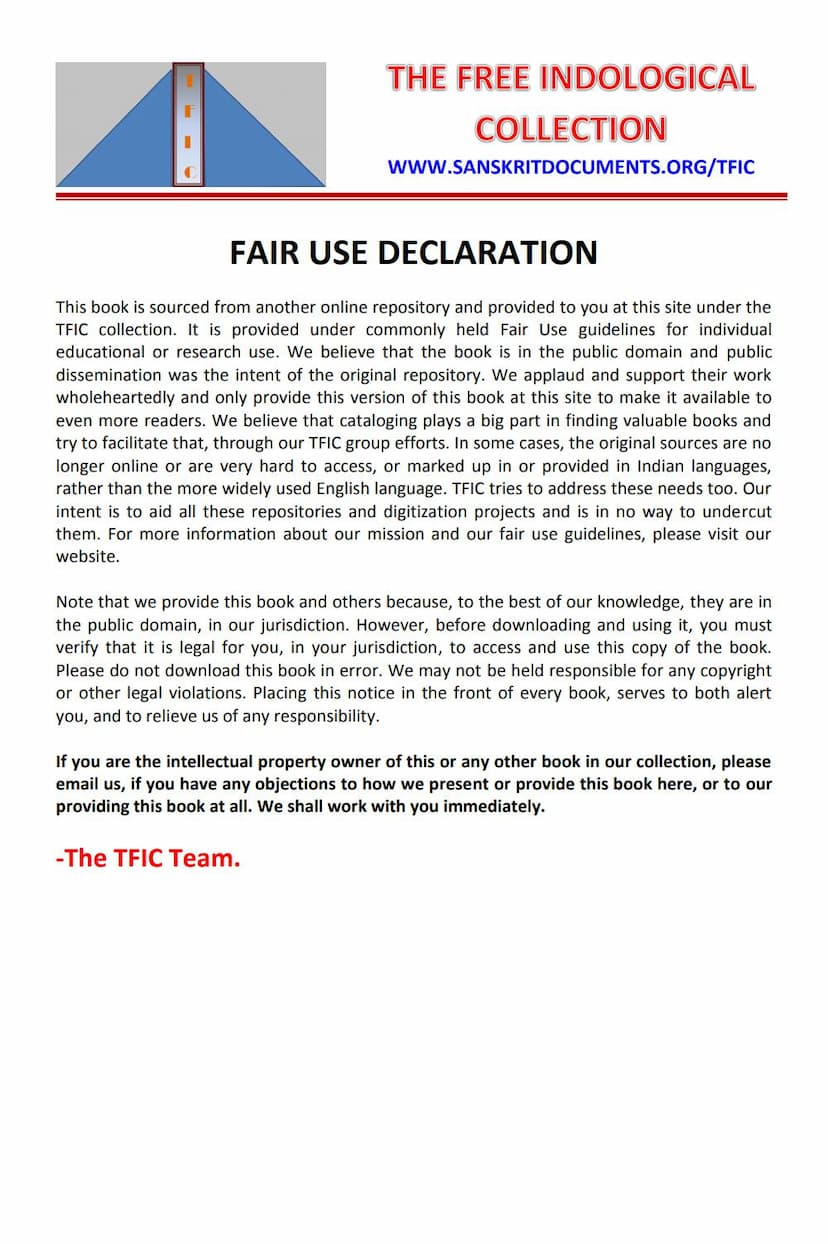Shukl Jain Mahabharat 02
Added to library: September 2, 2025

Summary
Here's a comprehensive summary of "Shukl Jain Mahabharat 02" based on the provided table of contents and introductory pages:
Overall Context:
"Shukl Jain Mahabharat 02" is the second volume in a Jain retelling of the epic Mahabharata, authored by Shuklchand Maharaj and published by Kashiram Smruti Granthmala, Delhi. This volume is part of a larger series aiming to present the Mahabharata from a Jain perspective, emphasizing Jain ethical principles and philosophical viewpoints. The text is intended for private and personal educational or research use.
Author and His Philosophy:
The author, Shuklchand Maharaj, is described as a highly respected Jain monk and a minister of the Shraman Sangh in Punjab. He is lauded for his spiritual discipline, scholarly depth, and ability to explain complex Jain philosophical concepts in simple, accessible language. His writings, including "Shukl Jain Ramayan" and "Shukl Jain Mahabharat," are presented as guiding lights for spiritual and ethical living, promoting truth, non-violence, forgiveness, and peace. He is seen as a direct successor to the ideals of great Jain Acharyas like Poojya Sohan Lal Ji Maharaj and Poojya Kashi Ram Ji Maharaj. His work is characterized by clarity, simplicity, compassion, and a deep understanding of Jain scriptures.
Content Overview (Based on the Table of Contents):
This volume covers a significant portion of the Mahabharata narrative, detailing the events from the Pandavas' initial detachment from worldly life to the conclusion of the war and the aftermath. The chapters are structured to follow the progression of the story:
-
Pandu's Renunciation (Paricched-1): Begins with King Pandu's growing detachment from worldly pleasures and his eventual renunciation, likely influenced by observing the natural world and its inherent truths, possibly through a Jain philosophical lens.
-
Hidimba's Marriage (Paricched-2): This chapter likely covers Bhima's encounter with Hidimba and their marriage, a significant event in the Pandavas' exile, where Jain principles of conduct and relationships might be highlighted.
-
Jarasandha's Demise (Paricched-3): Details the conflict and eventual death of Jarasandha, a formidable adversary, likely involving strategic planning and adherence to righteous warfare principles from a Jain perspective.
-
The Wonderful Palace (Paricched-4): Introduces the construction of the wax palace and Duryodhana's subsequent conspiracies. This section would likely focus on the deceitful tactics employed by the Kauravas.
-
Draupadi's Disrobing (Paricched-7): A pivotal and tragic event in the Mahabharata, detailing the humiliation of Draupadi. From a Jain perspective, this would likely emphasize the severe consequences of unethical conduct and the power of devotion.
-
Krishna's Pledge (Paricched-9): Focuses on Lord Krishna's role and his unwavering commitment, possibly in mediating peace or ensuring justice.
-
The Dice Game and its Aftermath (Paricched-14, 15, 16, 17, 18, 19): This series of chapters likely covers the disastrous dice game, the Pandavas' subsequent enslavement, the killing of Kichaka, and the ongoing anxieties of Duryodhana.
-
Vrihannala as a Warrior (Paricched-20): Likely describes Arjuna's incognito phase as Vrihannala and his subsequent emergence as a warrior, perhaps highlighting disguised dharma or the consequences of one's actions.
-
The Peace Efforts and War's Commencement (Paricched-27 to 33): Covers Krishna's attempts at peace, Duryodhana's arrogance, the appointment of generals, Krishna's counsel to Arjuna, and the beginning of the war with the subsequent days of fighting.
-
Key Battles and Losses (Paricched-34 to 41): Details the specific days of the war, focusing on significant events like Bhishma's departure, various warriors' deaths, and the unfolding of the war's strategy.
-
The Battle's Climax and End (Paricched-42 to 56): Describes the critical turning points of the war, including Karna's death, Duryodhana's end, the involvement of Ashwatthama, and the fallout of the war, including Gandhari's condemnation.
Key Themes and Jain Perspective:
While the specific Jain interpretations are not detailed without the full text, it's reasonable to infer the following from the author's description and the chapter titles:
- Karma and Destiny: The cyclical nature of birth and death, the influence of past actions on present circumstances, and the eventual triumph of righteousness are likely central themes.
- Ahimsa (Non-violence): Despite the war setting, the text might highlight moments of compassion, the ethical dilemmas of warfare, and the ultimate futility of violence, even in the name of justice.
- Dharma (Righteousness/Duty): The adherence to one's duty and the pursuit of righteous conduct, even in the face of adversity, would be a significant focus.
- Detachment and Renunciation: Pandu's renunciation and the general theme of finding spiritual liberation amidst worldly chaos are likely explored.
- Consequences of Actions: The text will illustrate the karmic repercussions of deceit, anger, lust, and violence, particularly evident in the downfall of the Kauravas.
- Spiritual Guidance: The role of spiritual teachers and the importance of seeking guidance from enlightened beings (like muni-like figures or spiritual discussions) would be integrated into the narrative.
In essence, "Shukl Jain Mahabharat 02" promises a comprehensive retelling of a substantial part of the Mahabharata, imbued with the ethical and spiritual teachings of Jainism, offering readers a chance to understand this epic narrative through a unique philosophical lens.